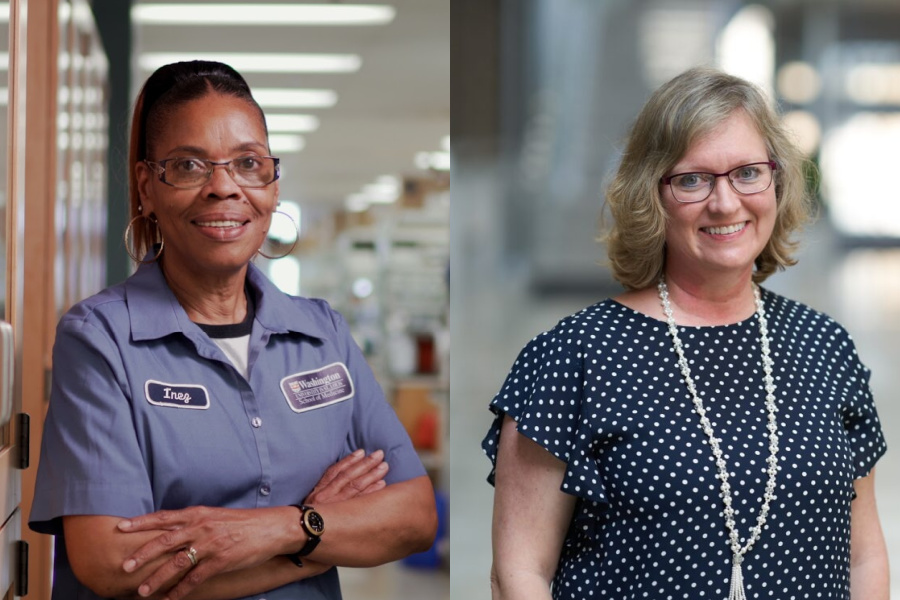When the COVID-19 pandemic shuttered labs and sent many researchers and staff into remote work, Inez Edwards continued to arrive at the McDonnell Medical Sciences Building in person, every day to vacuum, dust and sanitize, sanitize, sanitize. “It was scary times, but we got the job done,” says Edwards, who is a custodian at the Washington University School of Medicine in St. Louis. Although the favorite part of her job – interacting with faculty, staff and students – was missing, Edwards made sure floors 7, 8 and 9 were ready at any time to welcome back her colleagues.
“She was some of the glue that kept the place going,” says Debbie Pfeiffer, the assistant to the chair of the Department of Neuroscience, whose office is on the 8th floor. “I heard from people still coming in that Inez is here, even though no one is here, and she’s still happy and excited and doing a good job and trying to make a difference.”
Edwards’s dedication to her job in such challenging times – and in easier ones as well – has earned her the 2020 Operations Staff Award, for which Pfeiffer nominated her. The honor acknowledges those who went to great lengths over the past two years to keep WashU functioning during the trying circumstances imposed by the pandemic.
“Inez impresses me in many ways. She is personable with lab members and can communicate well to complete her job duties daily. She keeps her work very organized and scheduled to help the labs when working around them,” says Ann Olendorff, the facilities and compliance coordinator in the Department of Neuroscience, who has known Edwards for seven years. “Inez puts forth all her efforts daily to do an exceptional job.”
Pfeiffer is the recipient of the 2021 Operations Staff Award.
“Debbie supports the department across a variety of activities that go well beyond her position as assistant to the chair,” says Linda Richards, the Edison Professor of Neuroscience and the chair of the neuroscience department. “She is a key member of the operation engine that keeps our department functioning and enables all members to fulfill the department’s missions. Debbie makes our department an exciting, friendly and happy place to work.”
She puts her arm around new recruits, postdocs and students and just has that personal touch.
Karen O’Malley, professor of neuroscience
Pfeiffer’s career at Washington University began in 2008 as a program coordinator in the Health Communication Research Laboratory at the Brown School at Washington University in St. Louis, where she managed the Cancer Prevention and Control Research Network Project. In 2013, she became the program manager for the Applied Health Behavior Research graduate program in the Clinical Research Training Center at the School of Medicine and in 2014, she joined the Department of Neuroscience as the assistant to Dr. Azad Bonni, who was the chair at the time.
“Debbie has the great combination of a sharp mind, terrific organizational skills, strong work ethic and wonderful sense of community,” says Bonni, who is now the senior vice president and global head of neuroscience and rare diseases at Roche Pharma Research & Early Development. “She made people realize the department is competent and that WashU takes care of faculty, trainees and staff.”
The administrative role of the position appealed to Pfeiffer, as it taps into her organizational skills, “which she has in abundance,” says Karen O’Malley, professor of neuroscience, who contributed to the nomination package for the award. Pfeiffer manages everything from the chair’s calendar to the department’s seminar series, weekly newsletter and new faculty onboarding procedures. “She puts her arm around new recruits, postdocs and students and just has that personal touch,” continues O’Malley. Last year, when faculty and staff were largely working from home, Pfeiffer maintained virtual seminars and other department activities effortlessly, says O’Malley. “I can’t think of a better administrative assistant than Debbie, and I’ve been here more than thirty years now,” she adds.
Pfeiffer says she’s especially proud of the standard operating procedures (SOP) document she developed that outlines every aspect of her job. “When I came into this position, I had to figure everything out because there was no documentation,” she says. Now, her SOP is being used by assistants in other departments as a template to manage assistants’ duties.
Pfeiffer says the collegial, caring environment of the Department of Neuroscience is what she loves most about her job, and Edwards agrees. During the months of the pandemic when students and staff were absent, “I missed them for real,” she says. “Now it’s all good because they’re coming back.”
